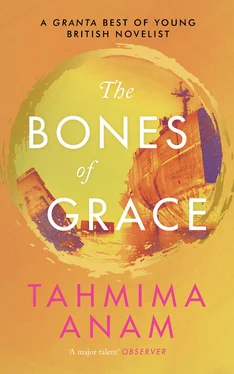I am the rising, I am the fall,
I am consciousness in the unconscious soul …
I am the rebel eternal,
I raise my head beyond this world …
Afterwards several people came and hugged my father. This was the first time since he had arrived in America that he had been touched with such affection. The embrace made him cry, because he had never mourned his brother, who had died before his eyes on the battlefield. He considered leaving the apartment in Queens, the smell of cigarettes and homesickness and people wearing too many layers in November. But that night, when he went home, he heard Bangla in the corridors of the building, and he knew he had to stay, so he settled for spending weekends with George, listening to Joni Mitchell on the reel-to-reel, planting a banana tree in the sunny part of the garden. Slowly, the wound of his brother’s death began to heal. He wrote long letters to his mother, composed while stuck in rush-hour traffic, taught the hippies to play cricket, and even brought his roommate, Asif, to the commune, where he sat uncomfortably on the edge of a patchouli-scented sofa and listened while the group chanted ‘Om.’ By now, my father had been in America for four years, and his visa was about to expire. He considered going home, but he was too ashamed to admit that he had done nothing but drive a taxi the entire time he had been in New York. His brother had set up a successful brick-making factory on the banks of the Buriganga, and he knew he would get roped into joining him if he went home without a purpose. He brought the problem to his few acquaintances. George told him to consider the political implications of choosing to participate in the military-industrial complex by remaining in New York. His landlord, the owner of the restaurant downstairs, offered him a share in the new branch he was planning to open in Alphabet City, his first in Manhattan. It was Asif who suggested to my father that, if he wanted to extend his time in America and take advantage of the opportunities in the land of opportunity — which he had not yet begun to do on account of his planting things and teaching people the correct way to bowl a cricket ball — the easiest thing for him to do would be to get married. There were networks for such things, people who knew people who knew people. But my father did not want an anonymous match. He gave himself three weeks to fall in love. He walked up and down the streets and tried to look into the hearts of the women he passed. He glimpsed into the rearview mirror at his customers. He glanced to the left and right of himself on the counter at the diner. But there was no one. No one would look my father in the eye. At the commune, the Namaste girl offered to marry him, and he refused politely. Finally, George introduced him to a friend, a rich Uptown girl who wanted to say fuck you to her parents. They got married in the back yard of the commune, flanked by the banana tree and the upright vines of tomatoes without a single relation on either side. Later, after my father decided he wanted to return to Bangladesh after all, his memories of the war now tamed, he was not saddened by the divorce, or by the letting go of his beloved taxi, or by moving out of the apartment he shared with Asif, but by George, who cried and said, ‘Man, you are a strange kind of people,’ and gave him a copy of Another Country to take with him on the long journey home.
Does this explain my behaviour? No. I did not live above a restaurant in Jackson Heights. I did not drive people around in a taxi and wait tables and save every bit of money I earned. My father erased his history behind him and made everything in my life easy. But, when I thought about it, this story gave me permission to make excuses to myself: I was not the only one who had married to solve a problem.
You wanted to play the piano one last time. ‘Can you take me up on the ship again?’ you asked Mo.
We went to the beach together. Grace was starting to look battered. Her hull had been breached; just that morning, the cutters had sliced off a rectangular section of her starboard side. There was no way Ali would allow us on board now. You and Mo made plans to sneak in. Mo described the exact route — he had taken it many times when scavenging on Grace . Not for the first time I realised Mo had a life beyond our gaze, that I should work harder to find out which of his stories were true and which were made up. But like so much else in my life, it didn’t seem urgent. All I could think about was you, and thinking about you was also thinking of myself, of what I would do with you, and when I look back I think of it as a selfish time, a time when I put myself at the centre of the universe, and perhaps that is what love is, a moment of abnegation as well as a moment of greed, a person at once invisible and fully present to the rest of their lives.
Because one side of Grace ’s hull was now cut away, we did not have to be pulleyed up to the deck in order to board her. We followed Mo to a rope ladder that had been hung out of one of the lower elevations of the ship, and once we had climbed on board we followed a complicated route through the remaining corridors and stairways, till finally we crossed what looked like a bridge, but must have been a gangway, into a section that I could recognise as the level that had housed the auditorium. Our voices echoed against the steel, our footsteps clanging like bells. The door to the auditorium was gone — now it was just a hole cut out of the shell of the ship. The chairs had been pulled up, the carpets stripped away. The shape of the proscenium arch survived, but not the wood that had framed it. The curtains were gone, but the stage remained, with the piano legs still fixed onto its surface, as if it had survived a bombing, black and gleaming and the only flash of shine remaining on this canvas of rust.
The piano stool had disappeared so you played standing up, leaning over the keys with your arms outstretched. I heard the familiar notes, the scale rising and rising. Variation 13. Little twists, an error here and there, places where you paused — it didn’t come naturally to you, Bach in the hands of a jazz pianist — but it was beautiful imperfection. Mo stood beside me and I slipped my arm around his shoulders, the music and the dark giving us permission to touch as if we were brother and sister, equal to each other in our love for you.
Even to my untrained ear, I could tell the piano did not sound as it should. In that way, I thought, it was very much like you and me. Every day that passed, we were exposed a little further to the elements, every day we became a bit more fragile, showing how easily we might be destroyed. How much we needed to be saved.
On the day of your departure we looked at the photographs we had taken together. There was an image of you leaning against the knotted roots of Heritiera fomes , the Sundri tree. The dark blue light of the forest cast a deep melancholy on your features, your usually bright eyes half closed, your lips pressed together without a smile. There were happier poses, you holding the oars at Foy’s Lake, you and Mo making sand angels on the beach, you and me up close, just an arm’s length from the camera, that first time we boarded Grace , but that one was my favourite because you were offering to leave a little piece of you in the frame, a glimpse into your darkest fears.
The driver was coming to pick us up at three o’clock. I was going to take you to the airport and then I was going to come back and do one last interview with the workers. Then I was going to go home, wait for Rashid, and tell him I was leaving him. I looked at the time, willing the hour to go by quickly so our goodbye could be over. We got into bed and made love. Afterwards, you covered my face with the palm of your hand. I closed my eyes and thought about what it would be like if I was going with you, packing my suitcase now and saying goodbye to everyone at Prosperity. Telling my parents. I felt a surge of anger at you for not pressuring me to come away now, for leaving it up to me to decide when and how I was going to break with my life.
Читать дальше












